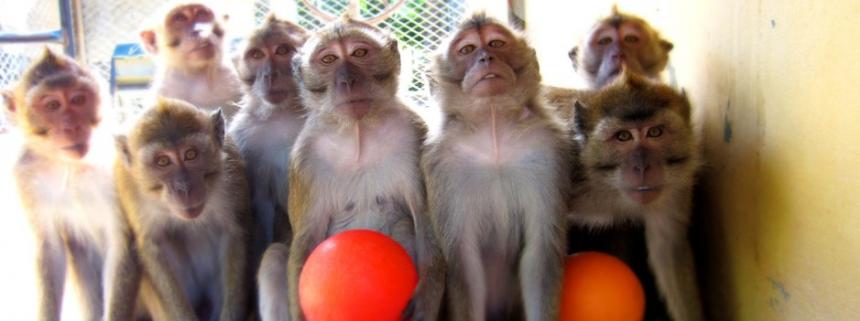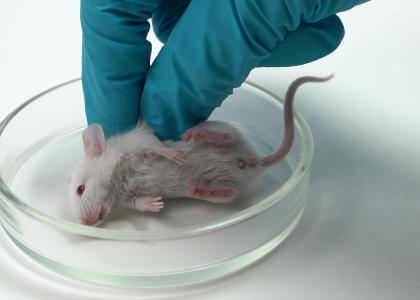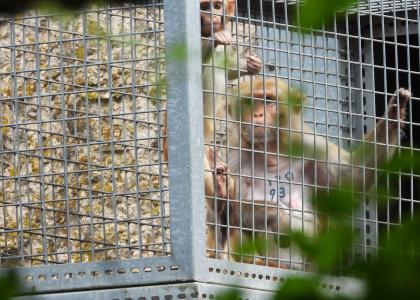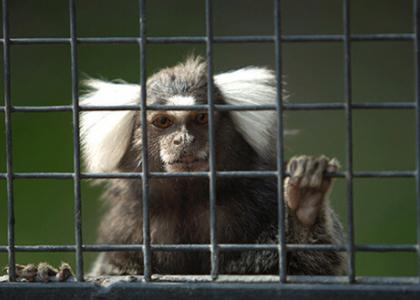Inhoud
Help de apen van Mauritius en stuur een email naar de ambassadeur!

Dierenrechtenorganisaties Animal Rights, Action for Primates en Progress Science Mauritius / NO Animal Experiments dringen aan bij de regering van Mauritius om een aanvraag voor de uitbreiding van een van de apenfokkerijen in het land en voor de vangst van wilde apen te weigeren.
Lees ook: Importeert Nederland wilde apen voor dierproeven?
Animal Rights organiseert op dinsdag 27 oktober tussen 10:30 en 12:30 een demonstratie voor de ambassade van Mauritius in Brussel en wil de dialoog aangaan met de ambassadeur.
We hebben nog maar tijd tot 31 oktober om ons te verzetten tegen de aanvraag voor een uitbreiding van de primatenfokkerij en het heropstarten van de wildvangst van apen in Mauritius. Daarom hebben we jouw hulp nodig.
Stuur de brief hieronder als mail naar de ambassadeur van Maurtius in Brussel: ambdillum@mubru.org en cc: ambsecmauritius@gmail.com, yramjanally@hotmail.com, saramchurn@govmu.org, vmunnohur@govmu.org.
Dear Mr Dillum,
I am writing to support the letter by Animal Rights, Action for Primates and Progress Science Mauritius/NO Animal Experiments.
26th October 2020
Dear Mr Dillum,
We are writing to raise our concerns with the Government of Mauritius regarding the capturing of wild long-tailed macaques (Macaca fascicularis) for the proposed expansion of a primate breeding farm. We have read in recent news media reports, that a company called Biosphere Trading Ltd, has submitted an application to the Government to expand its current breeding facility and to seek permission to capture long-tailed macaques from the wild to use as breeding animals (1).
During the revision of the European Union Directive on the protection of animals used for scientific purposes (Directive 2010/63/EU replaced Directive 86/609/EEC), it was acknowledged that animal welfare, animal health as well as ethical problems arise from the capture of non-human primates from the wild. To end the capturing of animals from the wild for both scientific and breeding purposes, the Directive set as one of its aims, after an appropriate transition period, to only allow non-human primates to be used in research, if they are the offspring of animals who have been bred in captivity (F2/F2+ generation), or who are sourced from self-sustaining colonies (SSC). (Article 10) (2)
A feasibility study, ‘The Feasibility study (Reference: 07.0201/2014/SI2.690759/SER/ENV.A3) as required in Article 10 of Directive 2010/63/EU on the protection of animals used for scientific purposes,’ which was carried out in 2017 set an implementation date for 2022. (3)
As you may know, Mauritius is the main supplier of long-tailed macaques to the EU. The Feasibility Study noted that 50% of the non-human primates used for the first time in research in the EU during 2014 were born in Mauritius.
Responses received, by the Feasibility Study, from Mauritius primate breeding companies claimed that prior to around 2008, breeding animals were obtained from the wild. However, since that date, “the colonies have been closed.”
It is, therefore, with disappointment we learn that 12 years later, there is the possibility that Mauritius will allow the resumption of capturing macaques from the wild for the research industry. The suffering involved in the trade in wild caught non-human primates is universally recognised. For example: In 2002 SCAHAW (an European Commission scientific committee) produced a report ‘The welfare of non-human primates used in research – Report of the Scientific Committee on Animal Health & Animal Welfare, adopted 17 Dec 2002’, in which it said:
‘To discourage the use of wild-caught animals the biomedical community should only accept captive-bred animals that are of the second or higher generation bred in captivity as being classified as “purpose-bred”. This would help to prevent the use of wild-caught animals as breeders’ (p50).
In a policy statement issued by the World Health Organisation (WHO) and Ecosystem Conservation Group (ECG), there is a recommendation that: ‘endangered, vulnerable and rare species be considered for use in biomedical research projects only if they are obtained from existing self-sustaining captive breeding colonies (i.e. in captive breeding, all animals are required to be at least F2 generation)’
The International Primatological Society guidelines for the acquisition, care and breeding of nonhuman primates state:
‘Sound animal welfare and scientific reasons exist for using captive-bred primates in preference to wild-caught primates, and institutions that currently trap from the wild should adopt policies to decrease reliance upon wild populations. Trapping quotas can be reduced by retaining a significant and increasing proportion of first generation offspring for breeding second-generation stock.’
We appeal to you, and the Government of Mauritius to deny the application by Biosphere Trading Ltd to expand its primate breeding facility and, thereby its capacity, through the capture of wild long-tailed macaques.
Yours Sincerely,
Sarah Kite, spokesperson for Action for Primates
Jacqueline Talbot, spokesperson for Progress Science Mauritius/NO Animal Experiments
Jen Hochmuth, spokesperson for Animal Rights
References:
https://defimedia.info/controverse-perspective-pour-une-ferme-de-7-500-singes-de-laboratoire
2010/63/EU OF THE EUROPEAN PARLIAMENT AND OF THE COUNCIL of 22 September 2010 on the protection of animals used for scientific purposes (Article 10) Directive: https://eur-lex.europa.eu/eli/dir/2010/63/oj
The Feasibility study (Reference: 07.0201/2014/SI2.690759/SER/ENV.A3) as required in Article 10 of Directive 2010/63/EU on the protection of animals used for scientific purposes,’ 2027
Report of the Scientific Committee on Animal Health & Animal Welfare, adopted 17 Dec 2002’, (page 50)
World Health Organization. (1971). Health Aspects of the Supply and Use of Non-Human Primates for Biomedical Purposes. Technical Report Series No. 470. World Health Organization, Geneva.
“Trade in Primates Captured in the Wild” International Primatological Society: http://www.internationalprimatologicalsociety.org/TradeInWildPrimates.cfm
Jen Hochmuth: “Wilde apen worden uit hun familie en natuurlijke omgeving weggerukt en rechtstreeks naar proefdierlaboratoria overal ter wereld geëxporteerd of in grote fokkerijen opgesloten. We willen een duidelijk signaal geven aan de regering van Mauritius: dierenrechten horen boven economische belangen te staan!”
Teken de petitie: Mauritius: stop de handel in apen!
Kom naar onze demonstratie op dinsdag 27 oktober tussen 10:30 en 12:30 voor de ambassade van Mauritius in Brussel, rue des Bollandistes 68, 1040 Etterbeek. Animal Rights heeft een eventpage aangemaakt op Facebook.
Bekijk hieronder de undercover reportage op Mauritius door Cruelty Free International. Opgelet, niet voor gevoelige kijkers.



